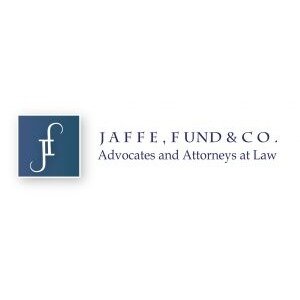Best Landlord & Tenant Lawyers in Jerusalem
Share your needs with us, get contacted by law firms.
Free. Takes 2 min.
Free Guide to Hiring a Real Estate Lawyer
List of the best lawyers in Jerusalem, Israel
About Landlord & Tenant Law in Jerusalem, Israel
Landlord and tenant law in Jerusalem, Israel, governs the rental of residential and commercial properties. The legal framework aims to balance the rights and responsibilities of both landlords and tenants to ensure fair and just relations. This encompasses agreements, rent control, eviction procedures, maintenance obligations, and dispute resolution. Understanding these laws is crucial for anyone entering into a rental agreement in Jerusalem.
Why You May Need a Lawyer
The complexities of landlord and tenant relationships can often lead to disputes and uncertainties where legal expertise may be required. Common situations include:
- Disputes over rent payments and increases.
- Issues with property maintenance and repairs.
- Unlawful eviction or failure to return security deposits.
- Drafting or reviewing rental agreements.
- Negotiating lease renewals or terminations.
- Cases of property damage or tenant neglect.
- Understanding tenant rights and landlord obligations under local laws.
- Representation in legal proceedings or mediation sessions.
Local Laws Overview
Several key legal frameworks govern landlord and tenant relations in Jerusalem:
- Rent Control: Certain areas in Jerusalem are subject to rent control laws, which limit the amount landlords can charge and restrict frequent rent increases.
- Tenancy Agreements: Written agreements must outline the terms of the lease, including duration, rent amount, payment terms, and responsibilities of both parties.
- Eviction Procedures: Eviction laws require landlords to follow a legal process which typically includes providing notice, seeking court approval, and allowing tenants time to vacate.
- Security Deposits: There are regulations regarding the amount landlords can demand and the conditions under which deposits can be withheld.
- Property Maintenance: Landlords are generally responsible for maintaining the property in a habitable condition, including making necessary repairs.
Frequently Asked Questions
What should a rental agreement include?
A rental agreement should include the names of the parties, description of the property, duration of the lease, rent amount, payment schedule, security deposit terms, and maintenance responsibilities.
How often can a landlord increase the rent?
In areas subject to rent control, landlords can only increase the rent according to specified regulations, typically once a year, and must provide advance notice to the tenant.
Can a landlord enter the property without notice?
Landlords usually cannot enter a rental property without giving reasonable notice, except in emergencies. The notice period and entry conditions should be defined in the rental agreement.
What are my rights if the landlord fails to make repairs?
If a landlord fails to make necessary repairs, tenants may have the right to withhold rent, make repairs themselves and deduct the cost from rent, or seek legal action to enforce the landlord’s obligations.
How can I terminate a lease early?
Terminating a lease early depends on the terms of the agreement and local laws. Tenants may need to provide notice, find a replacement tenant, or pay a penalty.
What can I do if I receive an eviction notice?
Tenants should review the notice for compliance with legal requirements, gather evidence supporting their case, and seek legal advice immediately to understand their rights and potential defenses.
How is the security deposit handled at the end of the lease?
Upon lease termination, the landlord must return the security deposit, minus any lawful deductions for unpaid rent, damages beyond normal wear and tear, or other specified reasons. Tenants should request an itemized list of any deductions.
Can I sublet the property?
Subletting generally requires the landlord's permission unless explicitly allowed in the lease agreement. Tenants should obtain written consent before subletting.
Who is responsible for utility bills?
Responsibility for utility bills should be clearly outlined in the rental agreement. Typically, tenants pay for their own utilities unless otherwise agreed upon.
What should I do if my landlord is harassing me?
Document all instances of harassment, report it to the police if necessary, and seek legal advice to understand your rights and possible actions to stop the harassment.
Additional Resources
For further information and assistance, consider contacting the following resources:
- Israel Ministry of Construction and Housing: Provides guidelines and regulations regarding housing and rental agreements.
- Jerusalem Municipality Housing Department: Offers assistance and resources specific to housing in Jerusalem.
- Legal Aid Department: Available through the Ministry of Justice, offers free or low-cost legal advice and representation for those who qualify.
- Tenants' Rights Organizations: Non-profits dedicated to protecting tenant rights and providing advice and support.
- Real Estate Lawyers: Professionals who specialize in landlord and tenant law and can provide comprehensive legal services.
Next Steps
If you need legal assistance regarding a landlord and tenant issue, consider the following steps:
- Identify Your Issue: Clearly determine the nature of your problem or question regarding your rental situation.
- Gather Documentation: Collect all relevant documents, including the lease agreement, communication with your landlord or tenant, and any notices received.
- Seek Legal Advice: Contact a qualified lawyer specializing in landlord and tenant law for personalized advice and representation.
- Utilize Local Resources: Reach out to governmental bodies or non-profits mentioned above for additional support and information.
- Proceed with Legal Action if Necessary: Follow your lawyer’s guidance on resolving the issue, whether through negotiation, mediation, or court proceedings.
Lawzana helps you find the best lawyers and law firms in Jerusalem through a curated and pre-screened list of qualified legal professionals. Our platform offers rankings and detailed profiles of attorneys and law firms, allowing you to compare based on practice areas, including Landlord & Tenant, experience, and client feedback.
Each profile includes a description of the firm's areas of practice, client reviews, team members and partners, year of establishment, spoken languages, office locations, contact information, social media presence, and any published articles or resources. Most firms on our platform speak English and are experienced in both local and international legal matters.
Get a quote from top-rated law firms in Jerusalem, Israel — quickly, securely, and without unnecessary hassle.
Disclaimer:
The information provided on this page is for general informational purposes only and does not constitute legal advice. While we strive to ensure the accuracy and relevance of the content, legal information may change over time, and interpretations of the law can vary. You should always consult with a qualified legal professional for advice specific to your situation.
We disclaim all liability for actions taken or not taken based on the content of this page. If you believe any information is incorrect or outdated, please contact us, and we will review and update it where appropriate.














